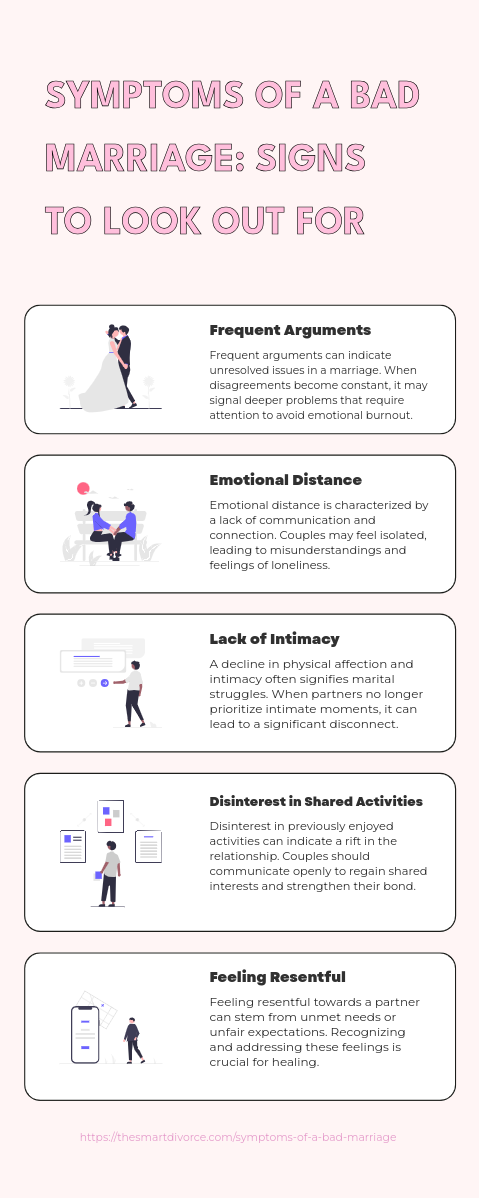Marriage is a cornerstone of happiness, but unaddressed problems can lead to severe issues. Recognizing the symptoms of a bad marriage early can prevent long-term damage. Understanding these signs helps you take action before things spiral out of control.
Key Symptoms of a Bad Marriage
- Lack of Emotional Connection
When one partner seeks emotional support and the other responds defensively, the bond weakens. This emotional disconnect is one of the most common symptoms of a bad marriage.
How to Address It:
- Acknowledge Concerns: Actively listen to your partner. Simple phrases like “I hear you” open meaningful conversations.
- Schedule Emotional Check-ins: Spend quality time together without distractions to rebuild emotional closeness.
- Defensiveness and Blame
Refusing to take responsibility creates distrust. Over time, it leads to resentment—an early warning sign of an unhealthy marriage.
How to Address It:
- Take Responsibility: Own your mistakes and apologize. Apologies can restore trust.
- Give Constructive Feedback: Use “I feel” statements instead of blaming language to shift focus from blame to solutions.
- Silent Treatment and Disengagement
Ignoring each other emotionally is often more damaging than arguments, serving as one of the signs of a troubled marriage. Silent treatment signals an emotional shutdown, a key indicator of an unhappy, loveless marriage.
How to Address It:
- Open Communication: Let your partner know if you need space but commit to revisiting the issue.
- Seek Professional Help: Consider working with a marriage therapist or licensed psychologist if communication breaks down.
- No Longer Prioritizing Each Other
When you stop spending quality time together, it’s a clear symptom of a troubled marriage. Your focus shifts to friends, work, or hobbies, which causes affective separation and leaves your partner neglected.
How to Address It:
- Recommit to Spending Time Together: Plan regular date nights and shared hobbies.
- Balance Personal Growth: Grow individually, but also prioritize time together.
- Missing Intimacy
Lack of physical and emotional intimacy often reflects deeper problems, including trust concerns. It’s a vital sign of an unhealthy marriage and a loveless marriage.
How to Address It:
- Rebuild Trust: Focus on resolving conflicts. Trust is essential for intimacy.
- Start Small: Little gestures, like compliments, can help rekindle closeness.
- Disrespect and Contempt
Disrespect through name-calling or dismissive behaviour, compounded by incessant bickering, undermines a relationship. Over time, this behaviour leads to an unhappy marriage.
How to Address It:
- Set Boundaries: Communicate what behaviour is unacceptable to prevent emotional disconnection and enforce those boundaries.
- Use Compassionate Communication: Approach conflicts with empathy and a focus on solutions.
- Repeatedly Crossing Boundaries
Ignoring emotional or personal boundaries leads to resentment and symptoms of a bad marriage.
How to Address It:
- Regular Boundary Check-ins: Have open discussions about boundaries and adjust as needed.
- Address Issues Early: Don’t let boundary violations build up—handle them immediately.
Symptoms of a Bad Marriage External Stressors
Financial Strain
Money problems can trigger unhappy marriage symptoms and foster reliability doubts. Disagreements over spending or hidden debts create tension.
How to Address It:
- Discuss Finances Openly: Regularly talk about financial goals to avoid surprises.
- Create a Budget Together: This helps both partners feel like they’re on the same team.
Family and Friends Dynamics
Outside influences, like opinions from family or friends, combined with incessant bickering, can cause marital strain. This pressure is a common sign of a bad marriage.
How to Address It:
- Set Boundaries: Limit how much influence outsiders have on your relationship.
- Prioritize Your Marriage: Keep communication with your spouse open about outside influences.
Career Changes and Personal Growth
Life changes, such as job shifts, can create emotional distance. Partners often drift apart without realizing it, causing an unhappy loveless marriage.
How to Address It:
- Align Your Goals: Regularly discuss your personal and shared goals to stay connected.
- Engage in Shared Hobbies: Spend quality time together by doing activities you both enjoy.
The Role of a Divorce Coach in Addressing Marriage Problems
If you notice these symptoms of a bad marriage, a Divorce Coach can guide you through the emotional challenges and offer practical solutions.
How a Divorce Coach Helps:
- Emotional Clarity: A coach helps you process your feelings.
- Conflict Resolution: Learn better communication strategies.
- Personal Growth: Focus on self-awareness and emotional well-being.
- Decision-Making Support: A coach can help you weigh your options.
When to Seek Help
If these signs are familiar, it might be time to seek professional help, such as a licensed psychologist or a couples therapist. You might also consider talking to a divorce lawyer to understand your options.
Final Thoughts
Recognizing the symptoms of a lousy marriage early can prevent long-term damage. Whether you work to save the relationship or move on, addressing these issues is critical. Take steps to improve your marriage by spending quality time together, seeking professional help, and prioritizing your partner.
For those experiencing these signs, seeking support from mental health professionals like a couples therapist or a licensed psychologist can offer valuable guidance.
At The Smart Divorce, we support you through your marital challenges. Whether you’re working to make your relationship stronger or considering a trial separation, our team, including Certified Divorce Specialist Sarah Bates and Certified Divorce Financial Analyst Ken S. Maynard, can help.
Schedule a Complimentary Call Today to take the first step toward clarity.


